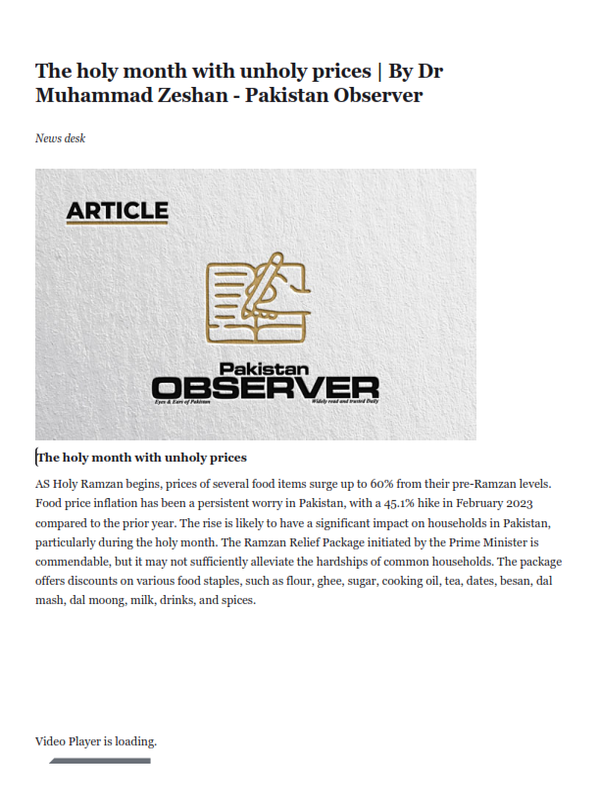The holy month with unholy prices
AS Holy Ramzan begins, prices of several food items surge up to 60% from their pre-Ramzan levels. Food price inflation has been a persistent worry in Pakistan, with a 45.1% hike in February 2023 compared to the prior year. The rise is likely to have a significant impact on households in Pakistan, particularly during the holy month. The Ramzan Relief Package initiated by the Prime Minister is commendable, but it may not sufficiently alleviate the hardships of common households. The package offers discounts on various food staples, such as flour, ghee, sugar, cooking oil, tea, dates, besan, dal mash, dal moong, milk, drinks, and spices.
The subsidy has two categories: targeted and general, with only BISP-registered users benefitting from the former. Unfortunately, most common households will not be able to avail this targeted subsidy, limiting the package’s efficacy in mitigating the impact of recent food price inflation. The Economic Survey of Pakistan reports only around 5.7 million registered households in BISP, leaving a significant portion of the population without direct subsidy access.
The package’s duration is another constraint as it is only applicable during Ramzan. While this may provide temporary relief to common households, it does not offer a long-term solution to the problem of food price inflation. Food prices may rise again after Ramzan, continuing to affect common households. Therefore, the government must devise a sustainable solution to address the problem of food price inflation. The main reason for food price increase is input cost. Fertilizers, seeds and other inputs’ prices are increasing, causing production costs to rise. This added production cost is then transferred to the consumers, leading to higher food prices.
Also, food price rise is due to recent flood-caused supply chain disruption, causing food shortage in some areas and higher prices. Farmers and suppliers had trouble and expensive transportation, leading to further price increase. Moreover, Pakistani rupee depreciation against the US dollar has also contributed to food price rise. As rupee depreciates, import cost increases, resulting in higher prices of imported food items like edible oil. To overcome above challenges, improvement of agricultural productivity is crucial, which is primarily caused by limited access to modern farming technologies, inadequate irrigation systems, and restricted credit facilities. The government should reduce regulations to boost investment, which not only helps meet the country’s food needs but also generates job opportunities and boosts the overall economy.
Apart from increasing agricultural productivity, the government should monitor food price inflation by improving storage and distribution systems for food items. Poor storage facilities cause food wastage, leading to shortages and higher prices. Improving these facilities ensures timely market access and stabilizes prices. To control food price inflation, promoting market competition can be another solution. The food market in Pakistan is currently dominated by a few large companies, which can lead to price manipulation. By promoting competition, consumers can access a variety of food items at fair prices.
The high cost of food could affect the religious obligations of households. Providing iftar and sehri meals to friends and family who are fasting is a customary practice. However, with high food costs, households may be unable to cater to these meals, leading to a sense of exclusion, especially for low-income families. The impact of rising food prices will be most significant on low-income households, as they generally allocate a significant portion of their income towards food. The surge in prices could lead to higher levels of poverty and food insecurity, forcing households to reduce their food intake or even skip meals. This, in turn, could have long-term health consequences.
In conclusion, the recent increase in food prices has significantly impacted common households in Pakistan. While the Ramzan Relief Package initiated by the Prime Minister is positive, it may not provide enough relief to the majority of households. To ensure affordable food access for common households, we require more investment in agriculture and control of food price inflation. Long-term solutions include increasing agricultural productivity, improving storage and distribution systems, and promoting market competition. Prioritizing this issue and taking necessary steps are crucial to avoid the adverse impacts of food price inflation on common households.
—The writer is Research Fellow, Pakistan Institute of Development Economics (PIDE),
Islamabad, Pakistan




